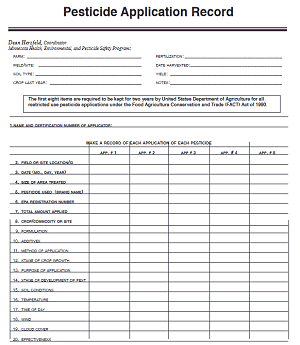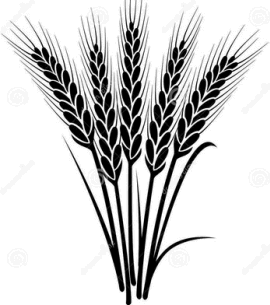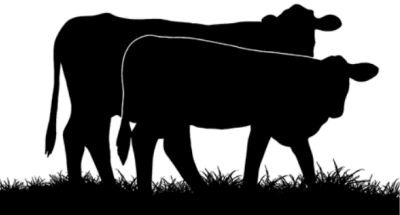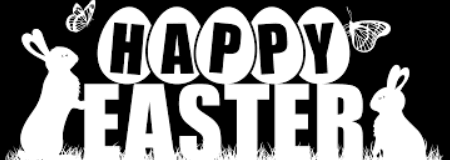

To send a message to an author, click on the author's name at the end of the article.
This Month in Ag Connection | Ag Connection - Other Issues Online
Pesticide is a broad term used to describe products that control pests. For example, insects may be pests, therefore insecticides are pesticides; plants may be pests, therefore herbicides are pesticides. Pesticides are classified as either restricted or general use. General use pesticides are not expected to cause adverse effects to the applicator or the environment when used in accordance with label directions. It is very important to read and follow all label directions to ensure the product is being used safely and effectively. Restricted use pesticides (RUPs) are classified as such, because without additional precautions, they may cause adverse effects to humans or the environment. Applicators of RUPs must be certified and licensed to purchase and apply them. If a product is classified as restricted use, it will be clearly stated on the front of the product label.
Pesticide labels are legal documents. Failing to follow the label directions may result in fines or possibly jail time. Reading and following all label directions is important to avoid misapplications or improper handling which may lead to harm to humans or the environment. Record keeping is a valuable tool to document the applicator has done due diligence to follow the label directions and therefore handled the product properly.
Individuals who produce agricultural commodities on property they own or lease may obtain a private pesticide applicator license from the Missouri Department of Agriculture by completing the required training. Private pesticide applicator training is conducted by University of Missouri Extension. Visit the MU Extension website: www.extension.missouri.edu/events and search for private pesticide applicator training to find face to face or online training programs or contact the local MU Extension office for more information.
Anyone who applies pesticides for hire, must obtain a commercial pesticide applicator license. Information about commercial pesticide applicator licenses can be found on the Missouri Department of Agriculture Bureau of Pesticide Control's website. https://agriculture.mo.gov/plants/pesticides/

The 1990 farm bill requires private certified pesticide applicators to keep records of all applications of federally restricted use pesticides. Applications, even spot applications of RUPs, must be recorded within 14 days of the application and those records must be kept for two years. When products are tank mixed, all the products in the tank should be recorded even if they are not RUPs.
Records may be kept on paper or electronically. The record must contain:
Field location can be recorded using a map and/or written description; county, range, township, and section; USDA identification system; a legal property description; or the latitude and longitude. Dropping a pin on a smart phone while in the field can be a quick and easy way to record the latitude and longitude of the application site. When using latitude and longitude, also record a description which identifies the field to the applicator. There may be additional record keeping requirements on the label.
Weather data at the application site may be required by the label of some RUPs. Record the time of application, the temperature, wind speed at boom height and direction of the wind. Using weather data from a weather station in the general area may not be accurate for the conditions in the field. A handheld wind speed meter used at boom height at the time of application is the most accurate way to determine wind speed in the field.
When treating less than one tenth of an acre with an RUP the following records must be kept:
Recordkeeping can be helpful in evaluating the effectiveness of pesticide applications, determining how much product is needed annually, preventing carryover injury, improving rotation decisions, protecting the applicator from legal action if accused of improper pesticide use and determining best management practices for pest control.
Source: https://extension.missouri.edu/publications/mp692
Source: Valerie Tate, Agronomy Specialist
This Month in Ag Connection | Ag Connection - Other Issues Online
SCN Egg Counts - MU Extension is offering free soybean cyst nematode (SCN) egg counts with the support of the Missouri Soybean Merchandising Council.

Wheat Virus Testing - Also the MU Plant Diagnostic Clinic is offering free wheat virus tests. Over the past year, the clinic has diagnosed multiple viruses from Missouri wheat samples. In 2023, the clinic continues to offer the five-virus screen test. This test includes testing Wheat streak mosaic virus (WSMV), Wheat spindle streak mosaic virus (WSSMV), Soil-borne wheat mosaic virus (SBWMV), Barley yellow dwarf virus (BYDV) and Cereal yellow dwarf virus (CYDV).
The service fee for the test is normally $65 per sample, but in partnership with the MU Integrated Pest Management and MU Extension Field Crop Pathology programs the service is offered for free. With this service, the clinic hopes to collect both wheat variety and location data of current incidences of wheat virus in Missouri to better understand the disease severity and help growers better prepare for controlling detected diseases in the next season.
When collecting samples in the field, include information on GPS location data and variety for each sample. When submitting a wheat sample for virus tests, it is important to follow the guidelines to ensure sample quality. This article details wheat sample collection and submission: https://ipm.missouri.edu/cropPest/2022/4/wheatVirus-PT/.
For more information on the samples and tests contact your local extension agronomy specialist.
This Month in Ag Connection | Ag Connection - Other Issues Online
The MU Mesonet or weather station network encompasses about 45 weather stations across Missouri. The network is growing. Last year one station was added in New Madrid. This year two weather stations are being added this spring in Springfield and Sikeston.
The new weather stations are real-time meaning data is updated every five minutes. The weather station records variables including temperature, relative humidity, wind speed, wind direction, solar radiation, soil temperature and precipitation.
The weather stations record information important for agricultural producers and collect historical weather information for the National Weather Service, providing data for numerous meteorological, agricultural and hydrological research projects.
In the spring, agricultural producers can monitor soil temperatures at two-inch, four-inch and six-inch depths to determine when the soil is warm enough for planting. The wind speed and direction may be helpful data in determining spraying decisions. The evapotranspiration data can be helpful to producers who irrigate crops.
The Missouri network, which is a type of weather network meteorologists call a "mesonet," was established in 1992 with four automated weather stations. Three were in northwestern Missouri and one in the south-central part of the state. Today, there are forty-five weather stations. Most are real-time data meaning they are connected to the internet and recording data every five minutes. A few of the older stations are connected to the network via telephone lines and record data once each day. The weather stations are comprised of hardware and sensors including 3-meter towers and dataloggers. Some stations have supplemental sensors to observe fuel moisture (an indicator of wildfire risk), soil moisture, leaf wetness and barometric pressure.
Another use of the data gathered from the mesonet network, is for educational purposes through a subscription service. The University of Missouri has an education program called Horizon Point. It was designed several years ago to make precise weather information available to Missouri farmers. Site-specific weather reports and advisories are sent to participating farmers via e-mail. To sign up for the free Horizon Point subscription weather service, go to http://www.agebb.missouri.edu/horizonpoint. Subscribers will be prompted for an email address, password, GPS coordinates or latitude and longitude for farms/fields and predominate soil type of fields. Subscribers may manage advisories and frequency using their username and password.
Data from each of the weather stations is available online at www.agebb.missouri.edu/weather/stations.
For more weather related information see the Missouri Climate Center through the MU College of Agriculture, Food and Natural Resources at www.climate.missouri.edu.
Source: Mary Sobba, Ag Business Specialist
This Month in Ag Connection | Ag Connection - Other Issues Online
Ornamentals
Vegetables
Fruits
Resource: Missouri Botanical Garden
This Month in Ag Connection | Ag Connection - Other Issues Online
Boone County
Apr. 19-21
Columbia, MO
For details 573-875-5540 Ext 3

Clark & Lewis Counties
Aug. 21-23
Kahoka, MO
For details 660-767-5273 or email schreckb@missouri.edu
Moniteau County
May 22-24
For details 573-796-2010 Ext. 3
Linn County
Sept. 12-14
Linneaus, MO
For details 660-895-5123 or email tatev@missouri.edu
Pettis County
June 20-22
For details 660-826-3339 Ext. 3 or e-mail zach.harding@swcd.mo.gov
Cole County
Sept. 27-29
Jefferson City, MO
For details 573-893-5188 Ext. 3
The statewide list of schools can be found at https://www.missourifgc.org/grazing-schools.

Publishing Information
Ag Connection is published monthly for Northeast and Central areas of Missouri producers and is supported by the University of Missouri Extension, the Missouri Agricultural Experiment Station, and the MU College of Agriculture, Food and Natural Resources. Managing Editor: Mary Sobba.